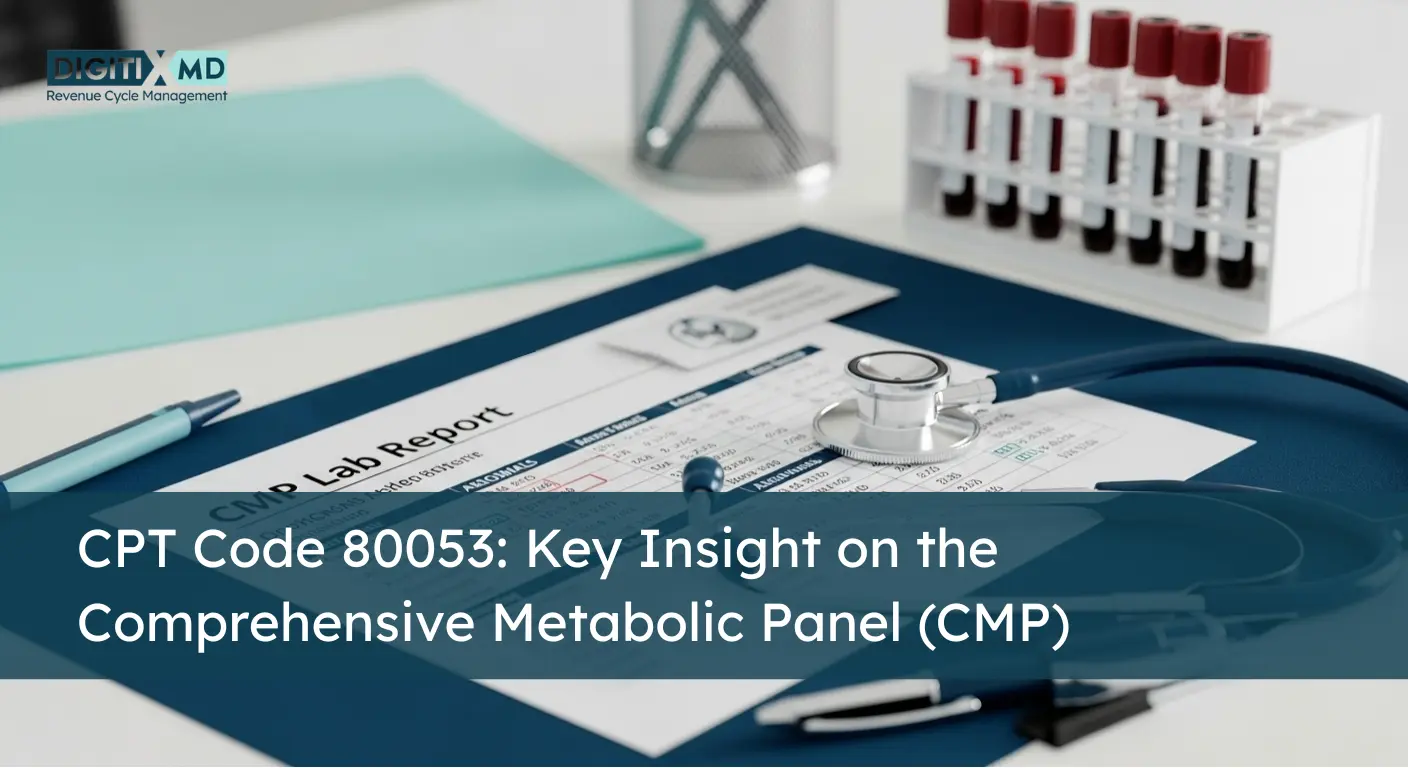Introduction — what CPT 80053 means
CPT code 80053 is the standardized code used to report the Comprehensive Metabolic Panel (CMP) — a single laboratory panel that bundles a set of chemistry tests routinely used to assess metabolic function, electrolytes, and liver and kidney health. The CMP is a common “general health” blood test used for screening, monitoring chronic conditions, or checking medication effects.
What’s included in the CMP (CPT 80053)?
The CMP groups 14 tests. Typical components listed in the CPT descriptor and common lab panels include:
- Glucose (blood sugar)
- Calcium (total)
- Albumin
- Total protein
- Sodium, Potassium, Chloride (electrolytes)
- Carbon dioxide (bicarbonate)
- Blood urea nitrogen (BUN) and Creatinine (kidney function)
- Total bilirubin
- Alkaline phosphatase (ALP)
- AST (SGOT) and ALT (SGPT) (liver enzymes)
These exact analytes align with the CPT descriptor for code 80053 and the panels offered by major laboratories. AAPC+1
Why providers order a CMP — clinical significance
A CMP is ordered because it provides a broad snapshot of organ/system health:
- Kidney function & hydration: BUN and creatinine indicate filtration and renal status.
- Liver health: Bilirubin and liver enzymes (ALP, AST, ALT) screen for liver injury or cholestasis.
- Electrolyte & acid-base balance: Sodium, potassium, chloride and CO₂ help evaluate dehydration, diuretic effects, and acid-base disorders.
- Metabolic issues: Glucose detects hyper/hypoglycemia; abnormal protein/albumin can reflect nutritional or chronic disease states.
Because it covers multiple systems, abnormal CMP results are often a screening signal pointing to either targeted follow-up tests or clinical correlation with history and medications.
Quick guide to interpreting common abnormal patterns
(These are succinct, clinician-oriented signposts — always correlate with history/meds/exam.)
- High BUN/creatinine: consider dehydration, acute or chronic kidney disease, or nephrotoxic medication.
- Elevated AST/ALT: possible hepatocellular injury (viral hepatitis, alcohol, meds). If ALP is disproportionately high, consider cholestatic processes or bone disease.
- Electrolyte shifts: low sodium (hyponatremia) or high potassium (hyperkalemia) have acute, often urgent implications. Check medication list (ACEi/ARB, potassium-sparing diuretics) and volume status.
- Low albumin / low total protein: chronic illness, malnutrition, nephrotic syndrome, or liver synthetic dysfunction.
(Use lab reference ranges from the performing lab — ranges vary by method and patient population.)
Billing, coding, and documentation tips
- Report CPT 80053 for the bundled CMP panel; do not separately bill component CPT codes for tests already included in 80053 unless you are legitimately reporting additional tests not contained in the panel. Confirm payor rules and lab policies before unbundling.
- Medical necessity & frequency: support CMP orders in the chart with clinical rationale (monitoring disease, drug monitoring, pre-op evaluation, symptoms). Medicare and MACs maintain guidance on reasonable frequency and documentation; check local coverage articles and the MAC policies for limits or requirements.
- Charge master / billing maintenance: with periodic CPT code updates and lab code changes, reconcile your charge master to ensure panel codes and pricing match current CPT guidance and payer expectation.
For practices that manage claims for many providers, consistent documentation and correct usage of 80053 reduces denials and audit exposure. Centers for Medicare & Medicaid Services+1
Common pitfalls and best practices for clinics
- Pitfall — duplicate billing: avoid reporting both the CMP panel and separate component codes for the same analytes.
- Pitfall — missing documentation: if ordered for routine “check” without problem or monitoring rationale, consider documenting a screening reason (well visit labs) or linking to a problem/medication being monitored.
- Best practice — reference ranges & lab variance: always display the lab’s reference intervals on patient results and interpret trends rather than a single value where possible.
- Best practice — patient instructions: explain fasting requirements for glucose when relevant, and advise patients about when to expect results and follow-up.
How DigitixmdRCM helps practices with CMP billing & revenue cycle
DigitixmdRCM can help medical practices by: ensuring correct CPT mapping in the charge master, auditing lab claims for panel vs component coding, training clinical staff on documentation that supports lab medical necessity, and appealing denials with clear, documentation-based arguments.
Conclusion
CPT 80053 — the Comprehensive Metabolic Panel — is a high-value, commonly ordered chemistry panel that provides clinicians a broad window into metabolic, renal, hepatic, and electrolyte status. Accurate coding, clear documentation of medical necessity, and careful interpretation of results are essential to both patient care and clean billing.
